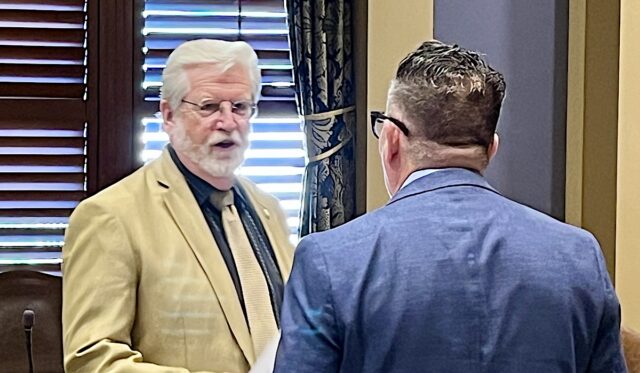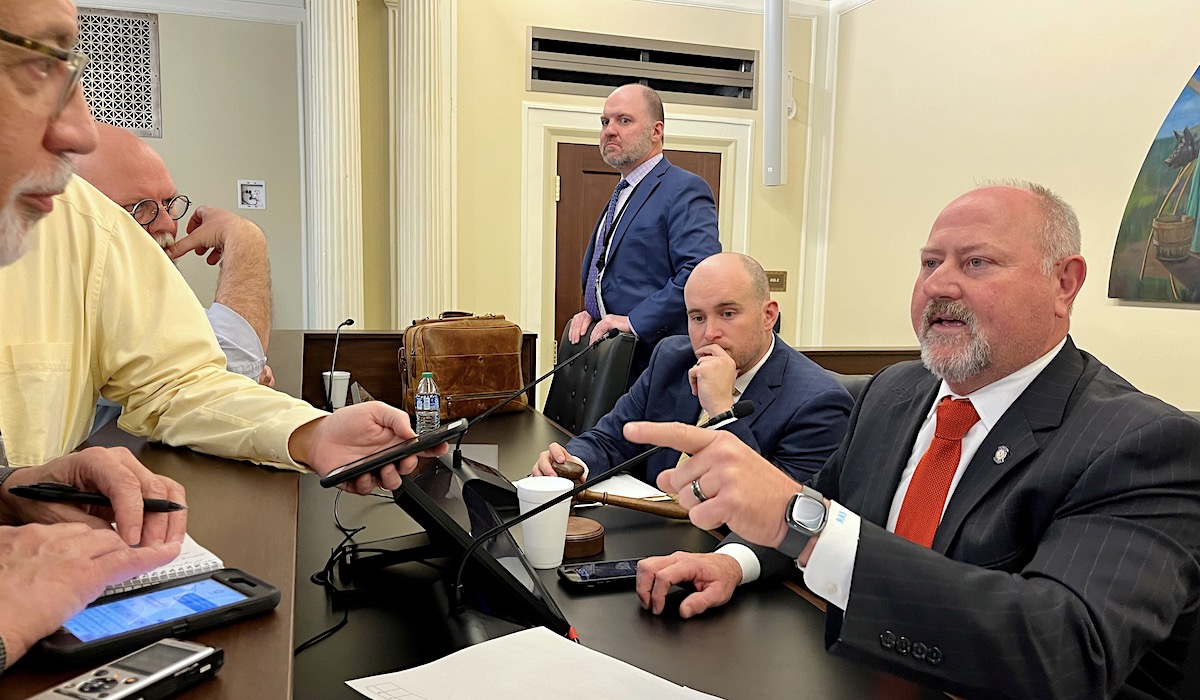

As incumbent House and Senate members submitted their reelection campaign paperwork today on the ground floor of the Oklahoma State Capitol to start the 2024 electoral filing period, the year’s inevitable budget battle blew up with a delayed and brief Senate appropriations hearing defined by a four-minute speech criticizing House leaders for not providing spreadsheets as promised.
“We deal with real money here, not Monopoly money,” said Senate Appropriations and Budget Chairman Roger Thompson (R-Okemah). “What we want to portray this year is that if a bill passes, there is a very quick deduction on the spreadsheet where we can see exactly (what it costs) live.”
One day earlier, Thompson thought he was preparing to receive the House’s starting budget numbers for the year’s formal negotiations. In an interview with NonDoc on Tuesday morning between a pair of Supreme Court oral arguments, Thompson said budget negotiations with the House had “been a very congenial process so far.”
“We sat down last week and just went over all of our numbers with them that we’ve been public about: How we arrived at our beginning numbers, what were our one-time expenses, our recurring expenses,” Thompson said Tuesday. “So we’re meeting at lunch today. I’ll receive the House numbers today. I know that our subcommittee members have been meeting with each other. (…) So we’ll see how close we are today.”
Hours later, however, the lunch meeting appeared to have concluded faster than anticipated, with Thompson and Senate budget staff spilling out of an elevator and grumbling about something. By Wednesday morning’s scheduled 10:30 a.m. Senate Appropriations and Budget Committee meeting, the grumbles had become the sort of groans that triggered a recess and an hour-long GOP Caucus meeting.
When Thompson, Senate President Pro Tempore Greg Treat (R-OKC) and others returned to their fifth-floor committee room, no House bills were heard, and Thompson delivered a four-minute monologue about how “the Senate has delivered our numbers to the public.”
“We still do not have their numbers, and therefore we will not be moving forward on hearing any House appropriations bills (…) until we receive their full numbers from the House,” Thompson said. “It is our conviction in the Senate that we started at the beginning to shine a light on the budget process, and if you go dark in the middle of that process, the entire process goes dark.”
Treat spoke with media after Thompson’s gavel galvanized the Senate’s position and adjournment.
“We’re not going to blink,” Treat said. “We’re serious that we want this budget process to be transparent. The House has all along never chosen to join us in a budget transparency initiative. They have wished to keep it the way we’ve always done. The Senate is absolutely committed to making the process transparent.”
Treat speculated as to the reason the House has not swapped spreadsheets with the Senate as requested, referencing the two chambers’ powerful Joint Committee on Appropriations and Budget process that has historically allowed legislative leaders to reveal dozens of bills around midnight for sunrise consideration.
“If their desire is to push this all to JCAB — which I have a sneaking suspicion it is — that completely eviscerates any progress we’ve made on creating transparency in the process,” Treat said. “JCAB is a useful tool, but it’s a more opaque tool than what we have chosen to do this year. If we go to Joint Committee on Appropriations and Budget, there will be two or three people making a lot of the decisions and [the bills] are not going to go to the floor. We know that we’ll have to use that process at some point. I have a sneaking suspicion that they’re wanting to push it all off to JCAB.”
Whenever legislators do inevitably get into the JCAB process, it’s expected to feature at least a little more transparency than last year. In October, House Speaker Charles McCall said he would pledge to put at least 24 hours between JCAB bills being revealed and being voted on to allow public review.
“Yes, I can make that pledge,” said McCall (R-Atoka).
‘The Senate is going to Senate’

When the House gathered for its own Appropriations and Budget Committee an hour later one floor below, representatives seemed largely jovial and undeterred by the chess pieces sliding around the board above them.
“The Senate is going to Senate,” House Speaker Pro Tempore Kyle Hilbert (R-Bristow) said moments before the meeting began. Hilbert, McCall’s heir apparent, previously served as vice chairman for the House Appropriations and Budget Committee.
When the meeting convened, Chairman Kevin Wallace (R-Wellston) jumped into hearing Senate bills and engaged in a performative question-and-answer exchange with House Floor Leader Jon Echols, who asked Wallace about lingering frustrations that the Senate’s new budget process has thus far prevented the chambers from having a JCAB meeting to approve supplemental appropriations for agencies’ Fiscal Year 2024 budgets.
Specifically, Wallace and Echols channeled Abbott and Costello to express their desire to make a $20 million supplemental appropriation to the Oklahoma State Department of Education and ensure that all school districts are made whole for teacher pay raises mandated last year. The issue left more than 40 off formula schools — meaning districts where high property taxes already provide increased local funding — with an “unfunded mandate.”
“Mr. Chairman, I heard for the first time today that there were some unfunded mandates by the Senate in the 2024 education budget,” said Echols (R-OKC). “Is there going to be a plan going forward? There was some talk about transparency in budget that I heard. Is there a plan going forward on how we are going to fix the 2024 education budget put forward by the Senate?”
Wallace replied with his consistent critique of the Senate’s new budget transparency process.
“Well, Mr. Leader, the first meeting I was allowed to have with the A&B team from the Senate was two weeks ago,” Wallace said. “I brought that up, and someone asked why I just now brought this up, and I said, ‘Well, this is the first time you’ve been allowed to meet with me.’ But we’ve got to figure out FY 24 before we move onto 2025. I am waiting on a solution from the Senate to fix the FY 24 budget — which is a very simple fix — but I would like for them to step forward and admit the mistakes they had in the appropriation process last year.”
An attorney, Echols said he had looked at HB 2673, a leftover vehicle from last session that senators amended to instruct OSDE to pay off formula school districts whatever amount is necessary to compensate them for the teacher raises required by the Legislature last year.
“It looked like one of the things they were asking is for off-the-funding-formula schools receive money from the funding formula,” Echols said. “I’ve been here 12 years, and I’ve never heard of such a thing. That would seem not just illegal but would give rise to a class-action lawsuit.”
Echols suggested that the Legislature use the JCAB process to “drop a $20 million increase into the FY 2024 education budget and move on and quit playing games to fund common education in the state of Oklahoma.”
Wallace approved of his colleague’s idea.
“I have asked for the Senate to provide two weeks in a row a solution,” he said.
During his remarks to media, Treat brought up the amended HB 2673 and claimed House leaders had not proposed an alternative.
“The House has expressed that they don’t like our solution,” Treat said. “Give us a solution. We have yet to see one. That’s what they’ve expressed the reason is they’re not giving us the budget.”
After the House committee heard a dozen Senate budget-related bills and adjourned, Wallace told media “there is a simple solution.”
“We’ve got to have a meeting. The best way to do it’s with a JCAB, which takes communication, collaboration. Both chambers have to agree. So I haven’t got that out of the Senate,” Wallace said. “All I heard was that temper-tantrum — ‘We ain’t hearing any A&B bills until you guys give us your numbers for (FY) 25.’ Well, I’d like to fix the (FY) 24 budget before (that).”
Similar to Treat suggesting that House members could be trying to run out the clock and force a JCAB-heavy appropriations process like prior years, Wallace fired his own speculation back across the rotunda.
“Here’s the other thing I can’t understand,” Wallace said. “Is it a political charge by the Senate to not fix it because they’re wanting Superintendent (Ryan) Walters to do something wrong? Or is it their pride and character that won’t allow them to say, ‘Hey, we made a mistake, we need to fix this. We need a $20 million supplement.’ But it’s that easy. It’s that easy.”
Asked if he would provide senators with the House’s budget position spreadsheet if they would agree to a JCAB meeting for the $20 million fix at OSDE, Wallace said he would.
“I will. I do want to have another conversation,” Wallace said. “You know, if we want to have press conferences on the House position, the House can gladly do that. Press releases don’t work. Communication back and forth has ceased, basically, between the chambers until just two weeks ago.”




















